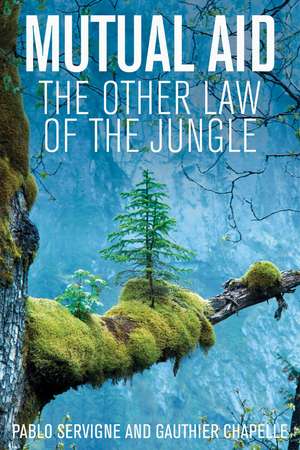Mutual Aid: The Other Law of the Jungle
Autor P Servigneen Limba Engleză Paperback – 25 noi 2021
| Toate formatele și edițiile | Preț | Express |
|---|---|---|
| Paperback (1) | 143.94 lei 3-5 săpt. | +14.95 lei 6-12 zile |
| Polity Press – 25 noi 2021 | 143.94 lei 3-5 săpt. | +14.95 lei 6-12 zile |
| Hardback (1) | 373.41 lei 3-5 săpt. | +20.49 lei 6-12 zile |
| Polity Press – 25 noi 2021 | 373.41 lei 3-5 săpt. | +20.49 lei 6-12 zile |
Preț: 143.94 lei
Nou
Puncte Express: 216
Preț estimativ în valută:
27.55€ • 28.54$ • 22.99£
27.55€ • 28.54$ • 22.99£
Carte disponibilă
Livrare economică 28 februarie-14 martie
Livrare express 13-19 februarie pentru 24.94 lei
Preluare comenzi: 021 569.72.76
Specificații
ISBN-13: 9781509547920
ISBN-10: 1509547924
Pagini: 310
Dimensiuni: 139 x 209 x 22 mm
Greutate: 0.36 kg
Editura: Polity Press
Locul publicării:Chichester, United Kingdom
ISBN-10: 1509547924
Pagini: 310
Dimensiuni: 139 x 209 x 22 mm
Greutate: 0.36 kg
Editura: Polity Press
Locul publicării:Chichester, United Kingdom
Notă biografică
Pablo Servigne is an agronomist with a PhD in biology. He is a specialist in questions of collapse, transition, agro-ecology and mutual aid. Gauthier Chapelle is an agronomist and biologist and an expert on biomimicry. He founded Biomimicry Europa and co-founded Greenloop.
Cuprins
Acknowledgements
Foreword by Alain Caillé
Introduction. The age of mutual aid
The law of the jungle
A potentially fatal paralysis
The emergence of another law of the jungle
The construction site of the new century
Chapter One. The history of a forgetting
Everywhere, all the time, and in every colour
Among one's peers
Between distant cousins
Between dissimilar organizations
Our most distant ancestors, champions of mutual aid in all categories
All the colours of 'symbiodiversity'
We are an inextricable bundle of interdependencies
Setting the record straight
Why society hasn't seen it - a story of myths
Kropotkin, the anarchist prince swimming against the tide
Our blinkered society
Why science didn't see it - a history of genes
Before the 1970s
The life, death and rebirth of sociobiology, 1970-2000
The renaissance of the 2000s
Chapter Two. Spontaneous mutual aid
Contrary to popular belief...
Where does Homo oeconomicus live?
What emerges in a crisis situation
What emerges from stress and the unknown
How are we to explain these automatisms?
The end of simplistic models
A malleable automatism
Chapter 3. Group mechanisms
The hard core of mutual aid: reciprocity
The obligation to give back
The roots of reciprocity
The transition to the group: extended reciprocity
Reputation (indirect reciprocity)
Rewards and punishments (enhanced reciprocity)
Very large groups: invisible reciprocity
Social norms
Institutions
Chapter Four. The spirit of the group
A magical moment: when the group becomes one
The sense of security
The sense of equality
The sense of trust
The birth of a superorganism
Towards universal principles?
The 'fundamentals': putting them into practice
The principles of good governance
Mutual aid taken to the extreme
The dissolution of the self
Collective ecstasy
Group closure
A tragic moment: when mutual aid collapses
Chapter Five. Beyond the group
The big bad wolf principle
Competition with other groups
A hostile environment
Reaching a common goal
Can groups provide mutual aid to each other?
Overcoming competition between groups
The same mechanisms as at the lower level
A limit on size?
The opportunity of global disasters
Chapter Six. Since the dawn of time
The evolution of human mutual aid
Associating to survive
A band of immature primates
The evolution of mutual aid between peers
'There is strength in unity': the power of group selection
'Winter is coming': the power of the hostile environment
Other evolutionary forces
The evolution of mutual aid between species
Needing the other...
... sometimes it's mutual...
... and eventually you can't do without them
Again and again the hostile environment
An endless source of innovation
Mutual aid calls for mutual aid
Transforming yourself in contact with others
Taking it to the next level
How mutual aid changed the face of the world
Conclusion. The new face of mutual aid
Much more than just a law of the jungle
The main principles of mutual aid
Towards a new vision of mutual aid
Epilogue. For which world?
Are we going to kill each other?
Towards another mythology
Beyond humankind
Appendix. On the 'new sociobiology'
An earthquake in the land of sociobiology
The secret had to lie in the genes
The slow betrayal of the founding father
The power of one man
The various evolutionary forces behind mutual aid
The origins of sociobiology: kinship selection and reciprocal altruism
The discovery of other paths: indirect reciprocity and spatial selection
Towards a more open and complex sociobiology
Notes
